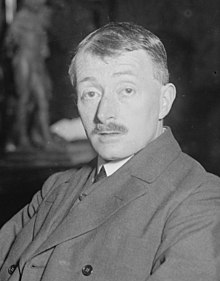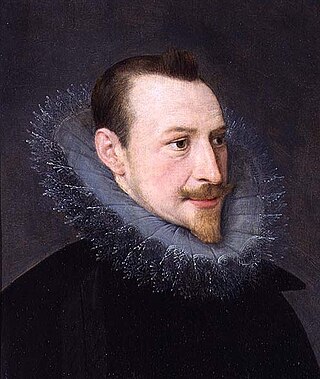
Edmund Spenser was an English poet best known for The Faerie Queene, an epic poem and fantastical allegory celebrating the Tudor dynasty and Elizabeth I. He is recognized as one of the premier craftsmen of nascent Modern English verse and is often considered one of the greatest poets in the English language.

John Edward Masefield was an English poet and writer, and Poet Laureate from 1930 until 1967. Among his best known works are the children's novels The Midnight Folk and The Box of Delights, and the poems The Everlasting Mercy and "Sea-Fever".
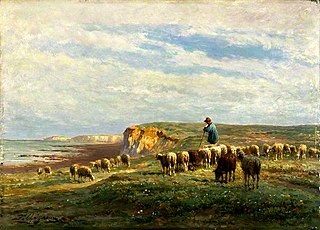
A villanelle, also known as villanesque, is a nineteen-line poetic form consisting of five tercets followed by a quatrain. There are two refrains and two repeating rhymes, with the first and third line of the first tercet repeated alternately at the end of each subsequent stanza until the last stanza, which includes both repeated lines. The villanelle is an example of a fixed verse form. The word derives from Latin, then Italian, and is related to the initial subject of the form being the pastoral.
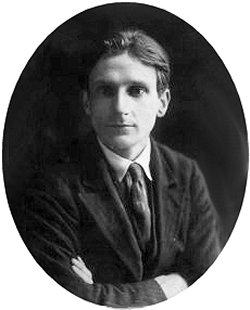
Edmund Charles Blunden was an English poet, author, and critic. Like his friend Siegfried Sassoon, he wrote of his experiences in World War I in both verse and prose. For most of his career, Blunden was also a reviewer for English publications and an academic in Tokyo and later Hong Kong. He ended his career as Professor of Poetry at the University of Oxford. He was nominated for the Nobel Prize in Literature six times.

Modern lyric poetry is a formal type of poetry which expresses personal emotions or feelings, typically spoken in the first person. It is not equivalent to song lyrics, though song lyrics are often in the lyric mode, and it is also not equivalent to Ancient Greek lyric poetry, which was principally limited to song lyrics, or chanted verse, hence the confusion. The term for both modern lyric poetry and modern song lyrics derives from a form of Ancient Greek literature, the Greek lyric, which was defined by its musical accompaniment, usually on a stringed instrument known as a kithara, a seven-stringed lyre. The term owes its importance in literary theory to the division developed by Aristotle among three broad categories of poetry: lyrical, dramatic, and epic. Lyric poetry is also one of the earliest forms of literature.

Robert Laurence Binyon, CH was an English poet, dramatist and art scholar. Born in Lancaster, England, his parents were Frederick Binyon, a clergyman, and Mary Dockray. He studied at St Paul's School, London and at Trinity College, Oxford, where he won the Newdigate Prize for poetry in 1891. He worked for the British Museum from 1893 until his retirement in 1933. In 1904 he married the historian Cicely Margaret Powell, with whom he had three daughters, including the artist Nicolete Gray.
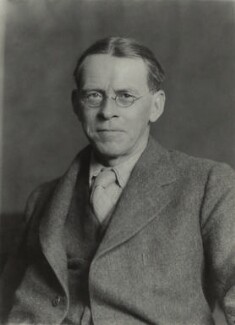
Lascelles Abercrombie, was a British poet and literary critic, one of the "Dymock poets". After the First World War he worked as a professor of English literature in a number of English universities, writing principally on the theory of literature.

Hilda Doolittle was an American modernist poet, novelist, and memoirist who wrote under the name H.D. throughout her life. Her career began in 1911 after she moved to London and co-founded the avant-garde Imagist group of poets with American expatriate poet and critic Ezra Pound. During this early period, her minimalist free verse poems depicting Classical motifs drew international attention. Eventually distancing herself from the Imagist movement, she experimented with a wider variety of forms, including fiction, memoir, and verse drama. Profoundly affected by her experiences in London during the Blitz, H.D.'s poetic style from World War II until her death pivoted towards complex long poems on esoteric and pacifist themes.
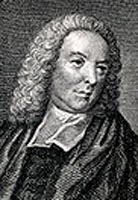
Edward Young was an English poet, best remembered for Night-Thoughts, a series of philosophical writings in blank verse, reflecting his state of mind following several bereavements. It was one of the most popular poems of the century, influencing Goethe and Edmund Burke, among many others, with its notable illustrations by William Blake.
Georgian Poetry refers to a series of anthologies showcasing the work of a school of English poetry that established itself during the early years of the reign of King George V of the United Kingdom.

Erich Fried was an Austrian-born poet, writer, and translator. He initially became known to a broader public in both Germany and Austria for his political poetry, and later for his love poems. As a writer, he mostly wrote plays and short novels. He also translated works by different English writers from English into German, most notably works by William Shakespeare.
John Edgell Rickword, MC was an English poet, critic, journalist and literary editor. He became one of the leading communist intellectuals active in the 1930s.
The King's Gold Medal for Poetry is awarded for a book of verse published by someone in any of the Commonwealth realms. Originally the award was open only to British subjects living in the United Kingdom, but in 1985 the scope was extended to include people from the rest of the Commonwealth realms. Recommendations to the King for the award of the Medal are made by a committee of eminent scholars and authors chaired by the Poet Laureate. In recent times, the award has been announced on the birthday of William Shakespeare, 23 April. However, Don Paterson was awarded the medal alongside the 2010 New Year Honours.
Thomas Moult (1893–1974) was a versatile English journalist and writer, and one of the Georgian poets. He is known for his annual anthologies Best Poems of the Year, 1922 to 1943, which were popular verse selections taken from periodicals on both sides of the Atlantic. His poem 'Truly He Hath A Sweet Bed' from Down Here the Hawthorn was set to music for chorus and orchestra by Cyril Rootham.
Edmund George Valpy Knox was a poet and satirist who wrote under the pseudonym Evoe. He was editor of Punch 1932–1949, having been a regular contributor in verse and prose for many years.
Nationality words link to articles with information on the nation's poetry or literature.
Richebourg-l'Avoué is a village and former commune in the Pas-de-Calais region of France. It was merged with Richebourg-Saint-Vaast to form the commune of Richebourg on 21 February 1971.

The Feast of the Poets is a poem by Leigh Hunt that was originally published in 1811 in the Reflector. It was published in an expanded form in 1814, and revised and expanded throughout his life. The work describes Hunt's contemporary poets, and either praises or mocks them by allowing only the best to dine with Apollo. The work also provided commentary on William Wordsworth and Romantic poetry. Critics praised or attacked the work on the basis of their sympathies towards Hunt's political views.

John Greening is an English poet, critic, playwright and teacher. He has published over twenty poetry collections large and small, including To the War Poets (2013) and The Silence (2019), both from Carcanet Press. He has edited a major illustrated edition of Edmund Blunden’s war memoir, Undertones of War, for Oxford University Press and produced editions of poetry by Geoffrey Grigson and Iain Crichton Smith. His anthologies include Accompanied Voices: Poets on Composers from Thomas Tallis to Arvo Pärt and Hollow Palaces. He has reviewed poetry for the Times Literary Supplement since the 1990s. His collected reviews and essays, Vapour Trails, appeared late in 2020. He is a recipient of the Alexandria International Poetry Prize (1981), the Bridport Prize (1998), the TLS Centenary Prize (2001) and a Cholmondeley Award (2008).
Claude Colleer Abbott (1889–1971) was an English poet, scholar and university lecturer, the 'C. C. Abbott' of academic publications. He is principally known as the editor of Gerard Manley Hopkins' correspondence.
